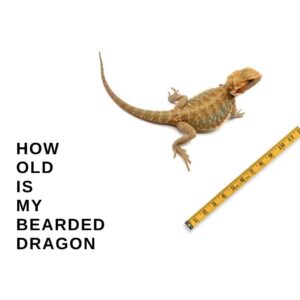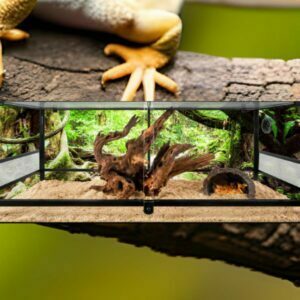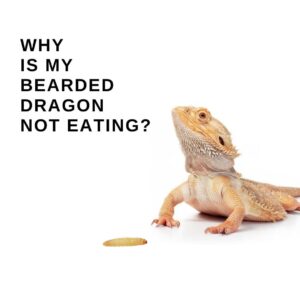Bearded dragons are omnivorous opportunistic predators and rely on movement and the ability to catch prey.
As pets, they are chill and don’t require complete replication of their natural bearded dragon diet.
But we can get close, just like we did with replicating their natural habitat in a tank.
In this guide, I’ll include great food sources, the percentage of each food for different life stages, and charts you can screenshot and use as guides.
Let’s get to it.
Bearded dragon diet: Table of Contents
What does a bearded dragon eat in nature?
In their natural habitat, the bearded dragon’s diet includes predominantly insects and available greens.
Insects, such as crickets, worms (including wax worms and mealworms), and roaches (like Dubia roaches and Goliath worms), make up a significant portion of their food intake.
The specific vegetation that bearded dragons eat in the wild includes dandelions, clover, flowers, grasses, and Perennial Soybean. They also consume vegetables like sweet potatoes, broccoli, cabbage, beans, peas, bell peppers, and kale.
Replicating their exact natural diet in captivity may not be possible or necessary, but providing a varied and balanced diet is a must for their health and well-being.
Remember to consider the age of your bearded dragon when planning its diet. Younger dragons tend to be primarily carnivorous, while adults are more herbivorous.
A balanced diet for bearded dragons consists of three main components:
- Protein
- Vegetables
- Fruits
Each of these elements provides different nutrients..
Protein
Protein helps support muscle growth and repair.
Ideal protein percentages for bearded dragons can vary based on their age and life stage. Here are the recommended protein percentages for baby, adult, and senior bearded dragons:
Baby Bearded Dragon: Baby bearded dragons require a higher percentage of protein in their diet compared to adults. The ideal protein percentage for baby bearded dragons is around 70-80% of their overall diet. This high protein content is essential for their growth and development.
Adult Bearded Dragon: Adult bearded dragons have different dietary requirements compared to babies. Their ideal protein percentage should be around 20-30% of their overall diet. Adult bearded dragons require a more balanced diet that includes a variety of other nutrients.
Senior Bearded Dragon: As bearded dragons age, their protein requirements may decrease. Senior bearded dragons should have a protein percentage of around 10-20% of their overall diet. However, specific protein needs may vary depending on the individual dragon’s health and activity level.
Sources of protein for beardies
| Protein sources | Feeding schedule |
| crickets | daily |
| dubia roaches | daily |
| mealworms | In moderation 1/week |
| superworms | In moderation 1/week |
| black soldier fly larvae | In moderation 2/week |
Insects: Insects are an excellent protein source for bearded dragons. Some recommended insects include:
- crickets
- dubia roaches
- mealworms (in moderation)
- superworms (in moderation)
- black soldier fly larvae (phoenix worms)
Crickets
Crickets contain high protein and relatively low fat content. They are easily digestible for bearded dragons and provide essential nutrients for their growth and overall health.
Dubia Roaches
Dubia roaches are considered one of the best staple insects for bearded dragons. They are rich in protein, low in fat content, and provide a range of valuable nutrients. Dubia roaches are easy to digest and come in different sizes depending on the bearded dragon’s life stage.
Mealworms
Mealworms can be fed to bearded dragons in moderation due to their lower calcium-to-phosphorus ratio. While they are a good source of protein, excessive feeding of mealworms can lead to an imbalance in nutrients.
Superworms
Superworms are another option that can be fed to bearded dragons in moderation. They are larger than mealworms and provide a good amount of protein. However, their tough exoskeleton can make them harder to digest, so they should be given sparingly and not as a primary food source.
Black Soldier Fly Larvae (Phoenix Worms)
Black soldier fly larvae, commonly known as phoenix worms or calciworms, are highly nutritious for bearded dragons. They are rich in protein, calcium, and other essential nutrients.
How often should you feed protein
| Bearded dragon age | Protein | Times/day |
| Baby | 80% proteins | 4-5 |
| Juvenile | 30% proteins | 3 |
| Adult-Senior | 20% proteins | 1 |
Some protein sources should be avoided for bearded dragons. Here are some examples of bad protein sources for bearded dragons:
Toxic or Harmful Insects: Bearded dragons should not be fed insects such as fireflies, beetles, spiders, or insects caught from areas treated with pesticides or herbicides. These can be toxic to bearded dragons.
High-Fat Insects: Insects with high fat content, such as waxworms or butterworms, should only be fed occasionally or in moderation. Their high-fat content can lead to obesity and other health issues if fed excessively.
Wild-Caught Insects: Avoid feeding bearded dragons with insects caught from the wild, as they may carry parasites or have been exposed to harmful substances.
Vegetables
| Alfalfa | daily |
| Butternut squash | daily |
| Prickly pear | daily |
| Collard greens | daily |
| Mustard greens | daily |
| Turnip greens | daily |
| Acorn squash | a few times a week |
| Bell peppers | a few times a week |
| Carrots | a few times a week |
| Green beans | a few times a week |
| Hibiscus | a few times a week |
| Parsnip | a few times a week |
| Red cabbage | a few times a week |
| Watercress | a few times a week |
| Yellow squash | a few times a week |
| Celery | 2/month |
| Cucumber | 2/month |
| Green cabbage | 2/month |
| Peas and snap peas | 2/month |
| Zucchini | 1/ month |
| Tomato | 1/ month |
| Radish | 1/ month |
| Okra | 1/ month |
| Cooked sweet potato | 1/ month |
Vegetables provide essential vitamins, minerals, and fiber.
Dark leafy greens like collard greens, mustard greens, and dandelion greens are excellent choices. These greens are not only packed with nutrients but also help promote proper digestion in bearded dragons.
The percentage of vegetables in a bearded dragon’s diet may vary depending on their life stage:
Baby bearded dragons (0-4 months): Their diet should consist of approximately 20% vegetables and greens.
Adult bearded dragons: Adult beardies should have a diet comprising approximately 80% vegetables and greens.
Senior bearded dragons: Senior beardies have similar dietary requirements to adult dragons, with approximately 80% of their diet consisting of vegetables and greens.
Best vegetable for bearded dragons
Collard Greens: Collard greens are rich in calcium, vitamin A, and fiber. They are an excellent staple vegetable for bearded dragons of all life stages. They have a calcium-to-phosphorus ratio of 3:1, which is ideal for healthy bone growth and development.
Mustard Greens: Mustard greens are another nutritious leafy green vegetable for bearded dragons. They provide essential vitamins and minerals, including calcium and vitamin K. Mustard greens have a calcium-to-phosphorus ratio of 2:1.
Turnip Greens: Turnip greens are highly nutritious and contain high levels of calcium, vitamin A, and vitamin K. They are a great source of dietary fiber as well. Turnip greens have a calcium-to-phosphorus ratio of 2:1.
Dandelion Greens: Dandelion greens are packed with nutrients, including calcium, vitamin A, and vitamin C. They also provide dietary fiber and have a calcium-to-phosphorus ratio of 2:1.
Kale: Kale is a nutrient-dense vegetable that is rich in vitamins A, C, and K. It also contains calcium and dietary fiber. However, kale should be fed in moderation due to its high oxalate content, which can bind to calcium and hinder its absorption. It is recommended to offer kale occasionally rather than as a staple.
Swiss Chard: Swiss chard is a leafy green vegetable that can be offered a few times a week. It provides a good variety of nutrients for your bearded dragon.
Bell Peppers: Bell peppers, particularly red and yellow varieties, can be given as an occasional treat. They provide vitamin C and add some variety to the diet.
Squash: Various types of squash, such as butternut squash and yellow squash, can be fed to bearded dragons a few times a week. They are a good source of vitamins and minerals.
Green Beans: Green beans are safe for bearded dragons and can be offered once or twice a week. They provide fiber and other nutrients.
Carrots: Carrots are a nutritious vegetable that can be given occasionally, but in moderation due to their higher sugar content. They can be offered once or twice a week.
Sweet Potatoes: Sweet potatoes are a good source of vitamins and can be given occasionally. They should be cooked and offered as a treat once or twice a week.
Vegetables to avoid in bearded dragon diet
While bearded dragons are omnivores and can eat a range of vegetables, there are a few vegetables that should be avoided due to potential health risks.
Spinach: Spinach contains high levels of oxalates, which can bind to calcium and prevent its absorption. Feeding spinach regularly can lead to calcium deficiency and metabolic bone disease in bearded dragons.
Rhubarb: Rhubarb leaves and stalks contain oxalates and potentially toxic substances. Feeding rhubarb to bearded dragons can cause severe health issues, including kidney problems.
Beet greens: Beet greens contain high levels of oxalates, similar to spinach. Feeding beet greens in large quantities can interfere with calcium absorption and contribute to metabolic bone disease.
Cruciferous vegetables like cabbage, broccoli, and Brussels sprouts, contains goitrogens. Goitrogens can interfere with thyroid function and should be fed in moderation to avoid thyroid-related issues.
Iceberg lettuce: Iceberg lettuce has a high water content but lacks significant nutritional value for bearded dragons. It does not provide the necessary nutrients and can lead to digestive issues and diarrhea when fed in excess.
Mushrooms: Mushrooms lack the proper balance of nutrients required for a bearded dragon’s diet, and some varieties can be toxic to them, potentially leading to health issues or digestive problems. Therefore, it’s best to avoid feeding mushrooms to bearded dragons.
Citrus fruits: Citrus fruits, such as oranges, lemons, limes, and grapefruits, are high in citric acid, which can be harmful to bearded dragons’ sensitive digestive systems. Citric acid can lead to gastrointestinal disturbances and may even cause mouth sores in bearded dragons
Avocado: Avocado is toxic to many animals, including bearded dragons. It contains a compound called persin, which can be harmful and even fatal to reptiles. Consumption of avocado can lead to gastrointestinal issues and other health problems in bearded dragons.
Fruits
Fruits should be offered in moderation as they contain natural sugars. However, they provide important vitamins and minerals. Some suitable fruits for bearded dragons include papaya, strawberries, and blueberries. And yes, they can eat dragon fruit in moderation. Remember to remove any seeds or pits, as they can be harmful to your dragon.
Best fruits for bearded dragon diet
Apples: Apples are a good source of vitamins and fiber, making them a healthy choice for bearded dragons. However, it’s important to remove the seeds and core before feeding them to your pet.
Bananas: Bananas are rich in potassium and other essential nutrients. They are easy to digest and can provide a quick energy boost for your bearded dragon. Offer small pieces as an occasional treat.
Blueberries: Blueberries are packed with antioxidants and vitamins. They can support overall health and provide a tasty treat for your bearded dragon.
Grapes: Grapes are a good source of hydration and contain vitamins and minerals. However, they should be fed sparingly due to their high sugar content. Cut grapes into small pieces to prevent choking hazards.
Mangoes: Mangoes are rich in vitamin A and provide a delicious treat for bearded dragons. However, they are high in sugar, so offer them in moderation as an occasional treat.
Peaches: Peaches are a good source of vitamins and dietary fiber. They provide essential nutrients and can be offered as a treat. However, due to their high sugar content, feed peaches in moderation.
Can bearded dragons eat flowers
Bearded dragons can eat certain flowers as part of their diet.
Marigolds: Marigolds are rich in beta-carotene and vitamin C, but they should be offered in small quantities to avoid digestive issues.
Hibiscus: Hibiscus flowers are high in vitamin C and antioxidants. They can be fed to bearded dragons in moderation.
Daisy: Certain varieties of daisies can be fed to bearded dragons. However, it’s important to avoid any toxic varieties and offer them in small amounts.
Roses: Bearded dragons can eat rose petals. They are safe and can be a tasty treat for them.
Carnations: Carnations are generally safe for bearded dragons to consume. However, it’s best to offer them in moderation.
Some flowers, such as lilies, tulips, daffodils, and daylilies, should be avoided as they can be toxic and cause health issues.
When feeding flowers to your bearded dragon, make sure they are pesticide-free, sourced from a safe location, and offered as a treat rather than a staple part of their diet. Always wash the flowers thoroughly to remove any pesticides or contaminants.
How often do you feed a bearded dragon
| Bearded dragon age | Feeding per day | How many insects | Plants |
| Hatchling (0-3 months | 3-5 times per day | 5-10 | 1-2 teaspoons |
| Juvenile (3-12 months | 2-3 times per day | 10-15 | 2-3 tablespoons |
| Sub-Adult (12-18 months | 1-2 times per day | 10-15 | 1/4-1/2 cup |
| Adult – Senior 18+ months | 1 per day | 10-15 | Varied and based on appetite and needs |
The nutritional needs of a bearded dragon change as they grow and develop. Let’s take a look at how to provide the right diet for each life stage.
Diet for Baby Bearded Dragons
When it comes to feeding baby bearded dragons, their diet primarily consists of small insects, such as pinhead crickets and small mealworms.
Calcium supplementation is crucial during this stage, as baby bearded dragons require plenty of calcium for healthy bone growth. Dust their insects with a calcium powder specifically formulated for reptiles.
Diet for Juvenile Bearded Dragons
As bearded dragons transition from a baby to a juvenile stage, their diet expands to include larger insects like adult crickets and dubia roaches. The variety of vegetables should also be increased to provide a broader range of nutrients.
Continue with calcium supplementation, and consider adding a multivitamin supplement once or twice a week to ensure they receive all the necessary vitamins and minerals.
Diet for Adult – Senior Bearded Dragons
Adult bearded dragons have specific dietary requirements to maintain their health and prevent obesity. Their diet should consist of a variety of insects and a wide range of vegetables. Aim to provide a mix of leafy greens, bell peppers, squash, and carrots, among others.
Supplements should still be incorporated into their diet, but slightly less frequently than during the younger stages. Providing fresh water daily is also essential for hydration.
Common Nutritional Problems in Bearded Dragons
Unfortunately, many bearded dragons develop nutritional issues due to improper feeding practices. These problems can lead to a range of health complications, including metabolic bone disease, obesity, and organ dysfunction.
Avoid overfeeding your bearded dragon with a single type of food or relying too heavily on processed commercial diets. Instead, focus on providing a balanced mix of fresh, natural foods. Variety is key to ensuring your dragon receives all the necessary nutrients.
Another common issue is feeding inappropriate foods. Some foods, such as avocado, rhubarb, and spinach, are toxic to bearded dragons and should be avoided.
Be mindful of the size of food items you offer to your bearded dragon. Feeding large prey items or pieces of fruits and vegetables that are too big can lead to choking or digestive issues. Always cut food into appropriate sizes and monitor your dragon while it’s eating.
Hydration for Your Bearded Dragon
Hydration supports various bodily functions, including digestion, kidney function, and overall metabolism. Bearded dragons obtain most of their hydration through their food, especially the moisture-rich vegetables and fruits.
However, beardies need a shallow water dish to drink from. Make sure to change the water daily and monitor their thirst levels.
Here is a great water dish for bearded dragons.
How to Ensure Your Bearded Dragon is Drinking Enough
Some bearded dragons may be reluctant to drink from a water dish. If this is the case, you can encourage hydration by gently misting them with water using a spray bottle. They will lick the droplets from their skin, aiding in hydration.
Water-rich fruits like watermelon and cucumber can help increase their moisture intake. However, remember to moderate the fruit intake due to their high sugar content.
My Senior Paws is a participant in the Amazon Services LLC Associates Program, an affiliate advertising program designed to provide a means for sites to earn advertising fees by advertising and linking to Amazon.com. We also participate in other affiliate programs which compensate us for referring traffic.




